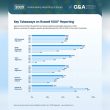The Federal Reserve, the Federal Deposit Insurance Corporation (FDIC), and the Office of the Comptroller of the Currency (OCC) have withdrawn the Principles for Climate-Related Financial Risk Management for Large Financial Institutions, ending the interagency guidance introduced in October 2023.
The agencies said they no longer consider such principles necessary, noting that existing safety and soundness standards already require all supervised institutions to maintain effective risk management practices proportional to their size, complexity, and activities. The withdrawal takes effect immediately and will be published in the Federal Register. The OCC had previously withdrawn its participation earlier this year.
The decision reflects a shift in supervisory focus toward traditional financial risks such as credit, liquidity, and interest rate exposures, rather than climate-related factors.
Federal Reserve Vice Chair for Supervision Michelle W. Bowman described the move as “an important step” in refocusing the supervisory process on material financial risks.
“The effect of this guidance was to create confusion about supervisory expectations and increase compliance cost and burden without a commensurate improvement to the safety and soundness of financial institutions or to the financial stability of the United States,” Bowman said in her statement.
Bowman also raised concerns that the earlier climate guidance could impose unclear and burdensome expectations, lead to unintended consequences for low- and moderate-income communities, and potentially pressure smaller banks to adopt standards intended only for larger firms.
“Institutions of all sizes have long been expected to manage the risks associated with their activities, including climate-related financial risks,” she noted. “While the guidance adopted a specialised regime for climate risks, it did not explain why this unique treatment was warranted.”
Bowman cautioned that such measures might discourage lending to certain industries, pushing them toward non-bank lenders and increasing costs for consumers. She also emphasised the need to prioritise core financial risks revealed during the banking stresses earlier this year.
“Climate change is an important public policy issue,” she said, “but the Federal Reserve’s mandates and responsibilities do not extend to climate policymaking. Our focus must remain on our statutory obligations.”
The rescission marks a significant policy reversal and underscores ongoing debate within US financial oversight bodies over the role of climate risk in banking supervision.


















